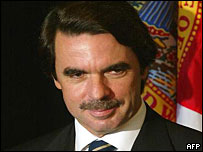|
Although at the crossroads of the Atlantic and the Mediterranean,
Europe and Africa, Spain was internationally isolated under General
Franco's post-Civil War (1936-39) dictatorship.
But it began to recover from recession in the 1950s, with a rise in tourism and aid from the US.
After Franco's death in 1975, the authoritarian regime
transformed into democratic government with King Juan Carlos as head of
state.
The constitution of 1978 enshrines respect for
linguistic and cultural diversity within a united Spain. The country is
divided into 17 regions which all have their own directly elected
authorities.
The level of autonomy afforded to each region is far
from uniform. For example, Catalonia, the Basque Country and Galicia
have special status with their own language and other rights.
Andalucia, Navarre, Valencia and the Canaries in turn have more
extensive powers than some other regions. Asturias and Aragon have
taken steps to consolidate language rights. It is a complex and
evolving picture.
One of Spain's most serious domestic issues continues to
be tension in the northern Basque region. The Basque separatist group
ETA is believed to have been responsible for the deaths of more than
800 people since it carried out its first killing in 1968.
The Supreme Court finally approved a government request
for a permanent ban on the Basque separatist party Batasuna in March
2003, despite the party's persistent denial that it is ETA's political
wing.
Spain shares the Iberian peninsula with Portugal and its
territory includes the Balearic Islands, the Canary Islands and two
North African enclaves.
From Velazquez in the seventeenth century, through Goya
straddling the eighteenth and nineteenth, to Picasso in the twentieth,
Spain has the proudest of traditions in art. Spanish Flamenco music and
dance are widely admired around the world while Cervantes' novel Don
Quixote is one of the most popular ever written. Cinema is much loved
in Spain and the films of directors such as Pedro Almodovar attract
huge audiences.
| SPAIN FACTS |
| Population: 41 million (UN, 2003) |
| Capital: Madrid |
| Major languages: Spanish (Castilian), Catalan, Gallego (Galician), Euskera (Basque)
|
| Major religion: Christianity
|
| Life expectancy: 76 years (men), 83 years (women) (UN)
|
| Monetary unit: 1 Euro = 100 cents
|
| Main exports: Transport equipment, agricultural products
|
| Average annual income: US $14,300 (World Bank, 2001) |
| Internet domain: .es |
| International dialling code: +34 |
Head of State: King Juan Carlos I
Spaniards honour King Carlos for ensuring the country's
transition to democracy after the death of the former dictator, General
Franco, and for saving Spain from a coup attempt in 1981.
Prime minister: Jose Maria Aznar
In March 2000, Prime Minister Jose Maria Aznar's Popular
Party became the first party of the right to gain an absolute majority
in parliament since democracy was restored in 1977.

Prime Minister Jose Maria Aznar
|
Mr Aznar was barely known outside Spain when he first
became prime minister in 1996, ending the 14-year rule of Socialist
Prime Minister Felipe Gonzalez.
His international profile was raised considerably when,
in the US-led build up to war against Iraq, he allied himself closely
with the positions of Washington and London in backing military action.
Born in 1953 into a right-wing family -
his grandfather was a friend of General Franco - Mr Aznar did not enter
politics until his mid-20s.
Commentators harp on his career beginnings as a
provincial tax inspector - but this has made the quiet conservative all
the more attractive to those who see him as the architect of Spain's
new-found prosperity. After two terms in office Mr Aznar will
stand down as prime minister when the next elections are held in March
2004. The Popular Pary has selected Mariano Rajoy, who has held various
posts in government, to lead it into the campaign.
Foreign minister: Ana Palacio
Interior minister: Angel Acebes
Broadcasting in Spain has witnessed a spectacular
expansion in recent years with the emergence of new commercial
operators and the launch of digital services.
The cable and satellite TV markets are expanding
steadily, sustained by the recently-launched digital channels. But the
introduction of digital terrestrial TV has been less successful; pay-TV
operator Quiero closed in 2002.
Home-produced dramas, "reality" shows and long-running "telenovelas" are staple fare on primetime TV.
Public radio and TV services are run by RadioTelevision
Espanola (RTVE), which is funded by advertising and state subsidies.
RTVE operates alongside many private radio and TV stations on a
national and regional level.
The Spanish media is considered to be free from
political influence and the major privately-owned newspapers have been
active in investigating high-level corruption.
The press
El Mundo - Madrid-based daily
El Pais - Madrid-based daily
ABC - Madrid-based daily
La Razon - Madrid-based daily
La Vanguardia - Barcelona-based daily
El Periodico de Catalunya - Barcelona-based daily
Television
TVE
- public, services include national networks La Primera and La 2,
satellite-delivered TVE Internacional, rolling news channel 24 Horas
Tele Cinco - national, commercial
Antena 3 - national, commercial
Canal Plus Espana - commercial, pay-TV channel
Radio
RNE
- public, services include speech network Radio 1, cultural network
Radio Clasica, youth-oriented Radio 3, news station Radio 5 Todo
Noticias Cadena SER - commercial
Onda Cero - commercial
Cadena COPE - church-controlled
News agencies
EFE - state-run
Europa Press - private
Vasco Press - private, Bilbao-based
|
